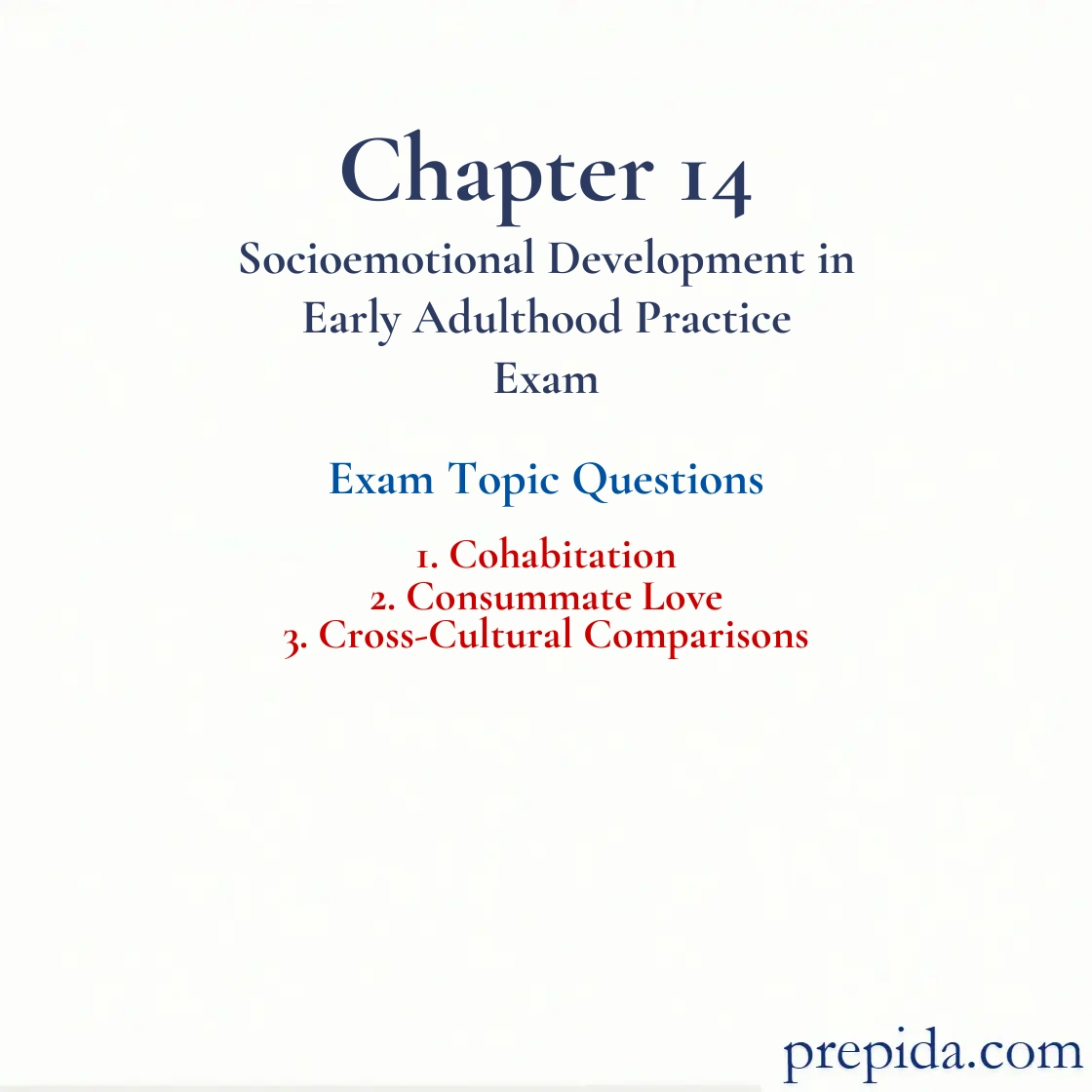
About This Chapter
This exam practice set explores verifying your knowledge of subjects such as the cohabitation, the consummate love and the cross-cultural comparisons. Provides a range of offers exam questions complete with verified answers, thorough explanations, and definitional guides supported by verified answers and in-depth explanatory guidance. All items feature verified responses, thorough explanations, concept definitions, and complexity grades for optimal preparation.
The learning outcomes are:
✓ Describe marital and nonmarital lifestyles.
✓ Identify key aspects of intimate relationships and love.
Question 1
In which country is cohabitation virtually universal before marriage?
- France
- Sweden
- United States
- Kenya
Correct Answer:
Sweden
Question 2
Living together in a sexual relationship without being married is known as
- consensual validation.
- attachment.
- coparenting.
- cohabitation.
Correct Answer:
cohabitation.
Glossary:
Habituation: Decreased responsiveness to a stimulus after repeated presentations of the stimulus.
Question 3
Which of the following statements about cohabiting arrangements in the U.S. is true?
- Most cohabiting couples want the official aspects of marriage.
- There is absence of any link between education and cohabitation rates in the U.S.
- The length of cohabitation has been increasing since 1995.
- Most of these arrangements are very long-lasting.
Correct Answer:
The length of cohabitation has been increasing since 1995.
Glossary:
Cohort Effects: Characteristics determined by a person’s time of birth, era, or generation rather than the person’s actual age.
Question 4
Which of the following statements about cohabitation is true?
- People who cohabitate with another person after a divorce have a higher rate of premarital happiness than people who live alone after a divorce.
- Couples who cohabitate before getting engaged have a better chance of a successful marriage than couples who wait until they are engaged to cohabitate.
- Couples who wait until they are engaged to cohabitate have a better chance of a successful marriage than couples who cohabitate before becoming engaged.
- Couples who cohabitate after getting engaged experience marital dissatisfaction earlier than couples who cohabitate earlier.
Correct Answer:
Couples who wait until they are engaged to cohabitate have a better chance of a successful marriage than couples who cohabitate before becoming engaged.
Glossary:
Commitment: Marcia’s term for the part of identity development in which adolescents show a personal investment in identity.
Question 5
According to research, which of the following statements is true of the link between cohabitation and marital instability?
- The link between cohabitation and marital instability is strong when only cohabitation with the eventual marital partner is examined.
- Cohabiting does not have a negative effect on marriage if the couple did not have any previous live-in lovers.
- Cohabiting has a negative effect on marriage if the couple did not have children prior to the marriage.
- The risk of marital dissolution between cohabitors is much larger when they cohabited in their mid-twenties.
Correct Answer:
Cohabiting does not have a negative effect on marriage if the couple did not have any previous live-in lovers.
Question 6
There has been ________ in the number of cohabiting U.S. couples since 1970.
- a dramatic increase
- little change
- a huge fall
- a steady rise
Correct Answer:
a dramatic increase
Question 7
Nicole and Matthew, a couple, are passionately in love with each other. They are attracted to each other and also share their thoughts and emotions. They are thinking of a future together and know that they can depend on each other even in the face of problems. According to Robert J. Sternberg's triarchic theory of love, Nicole and Matthew are most likely experiencing
- affectionate love.
- consummate love.
- fatuous love.
- passionate love.
Correct Answer:
consummate love.
Glossary:
Affectionate Love: In this type of love, also called companionate love, an individual desires to have the other person near and has a deep, caring affection for the other person.
Question 8
According to Robert Sternberg's triangular theory of love, consummate love is characterized by
- passion, intimacy, and commitment.
- romance, shared disclosure, and sexual desire.
- commitment and exclusiveness.
- eroticism and companionship.
Correct Answer:
passion, intimacy, and commitment.
Glossary:
Commitment: Marcia’s term for the part of identity development in which adolescents show a personal investment in identity.
Question 9
According to Robert J. Sternberg, ________ love is the strongest and fullest form of love.
- passionate
- fatuous
- affectionate
- consummate
Correct Answer:
consummate
Question 10
Which of the following statements about marriage around the world is true?
- Like Scandinavian countries, Japan has a low proportion of unmarried young people.
- Hungary encourages early marriage and childbearing to offset declines in the population.
- Individuals in Scandinavian countries marry earlier than Americans.
- Unlike in Scandinavian countries, cohabitation is popular among young adults in Japan.
Correct Answer:
Hungary encourages early marriage and childbearing to offset declines in the population.
Question 11
In the selection of a partner, there is high value placed on housekeeping skills in
- the United States.
- Canada.
- France.
- Estonia.
Correct Answer:
Estonia.
Question 12
In which of the following countries is chastity the most important factor in a marriage partner?
- China
- Japan
- Sweden
- Finland
Correct Answer:
China